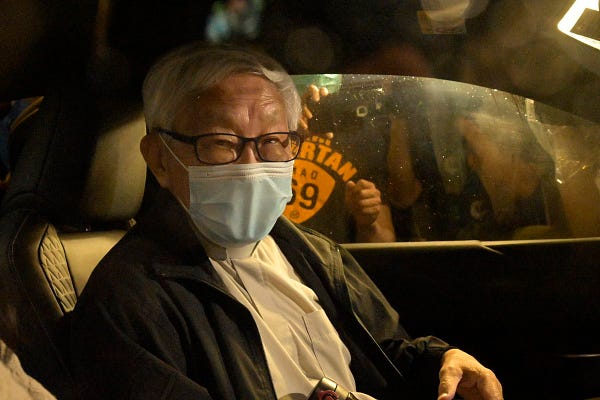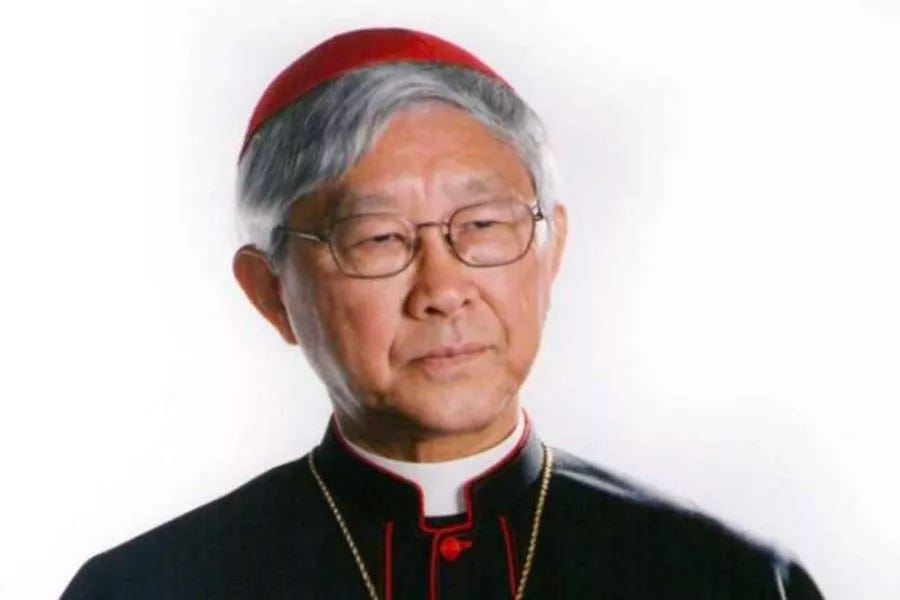Cardinal Joseph Zen has been released from police custody, Hong Kong journalists report, after his Wednesday evening arrest over charges related to a non-profit group of which Zen is a trustee. The cardinal is charged with colluding with foreign powers.
Zen’s arrest came Wednesday evening. The cardinal could face life in prison if convicted of colluding with a foreign government in his pro-democracy advocacy.


The charges are connected to the 612 Humanitarian Relief Fund, a now dormant charity that helped political arrestees in Hong Kong defray their legal expenses. Zen was a trustee of the charity, and was arrested alongside other Hong Kongers involved in the charity’s work.
Hong Kong journalists reported that Zen was released Wednesday after making bail; the cardinal had been held at the Chai Wan Police Station, according to Hong Kong media reports.
Zen’s passport was retained by Hong Kong police.



Shortly after Zen was arrested, the Holy See issued a statement saying that it was watching developments in Zen’s case “with concern.”
“The Holy See has learned with concern of the news of the arrest of Cardinal Zen and is following the developments of the situation with extreme attention,” the Vatican’s press spokesman Matteo Bruni said in a statement to journalists on Wednesday afternoon.
Catholics in Hong Kong had voiced concern about the possible arrest of Zen in recent months, since the cardinal was targeted by pro-government media earlier this year.
In January, Hong Kong paper Ta Kung Pao published four separate articles attacking Zen, who is a totemic figure for persecuted Chinese Catholics and pro-democracy advocates. Ta Kung Pao is owned by the Chinese Communist Party’s Liaison Office — the mainland government’s department charged with overseeing the Hong Kong government.
The government newspaper pointedly associated Zen with Jimmy Lai, the jailed Catholic newspaper publisher, and accused Zen of using his status as a clergyman to “disrupt” life in Hong Kong while lamenting that “it is difficult for the government to regulate or eliminate these religious groups or individuals, despite the fact that they have committed many crimes.”
Editorials in CCP-controlled newspapers are often used to signal forthcoming government action.
Zen’s arrest comes just three days after John Lee Ka-chiu, a Catholic, was declared the winner of a ballot to select the new head of the Hong Kong Government. Lee was the only candidate for chief executive considered by the special administrative region’s Election Commission, following electoral reforms imposed by Beijing requiring that all candidates for public office be “patriots.” Lee will assume office later this summer, succeeding Carrie Lam, another Catholic.
Thousands of riot police were deployed over the weekend to ensure there were no public demonstrations against Lee’s election. The new chief executive previously served as security minister for Hong Kong, and was responsible for attempting to pass a controversial extradition law in 2019 which would have allowed political prisoners to be extradited to the mainland — that bill triggered nearly a year of protests which brought Hong Kong to a standstill and led to the mainland government imposing a new National Security Law in 2020, criminalizing many forms of free speech and political dissent.
The arrest of the nonagenarian cardinal comes just months before the Vatican is set to renew its controversial agreement with the Chinese government on the status of the Church in China. It follows an steady stream of Chinese mainland arrests, detentions, and even disappearances of Catholic clergy, including bishops, who have refused to join the state-sponsored Chinese Patriotic Association, which requires acknowledging Communist Party authority over the Church.
Ed. note: An earlier version of this report said that Zen was arrested at Hong Kong’s airport, which was not the case. The error has been corrected.




